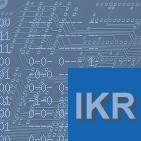 |
|
 |
Institute of Communication Networks and Computer Engineering (IKR)
|
 |
IKR Publication No 36542 |

|
|
 |
 |
 |
|
 |
 |
 |
Publication No 36542
|
|
Author(s)
|
Hu, G.*
|
|
Title
|
Performance Model for a Lossless Edge Node of OBS Networks
|
|
Topics
|
Others
|
|
Methods
|
Performance Evaluation
|
|
Keywords
|
ANALYTICAL MODEL; ASYMPTOTIC ANALYSIS; DELAY MODEL; OPTICAL BURST SWITCHING; OPTICAL PACKET SWITCHING; PERFORMANCE MODEL
|
|
Abstract
|
In this paper, the performance model for a lossless OBS edge node is built with respect to the queueing performance of the transmission buffer. In contrast to the shaping effect of the burst assembly in the bufferless edge node, in a lossless edge node the "burstifying" effect of the assembly is more dominant and leads to a worse queueing performance in the transmission buffer. We analyze the traffic characteristic by means of the variance process and identify that there exists a negative correlation structure in the assembled burst traffic in the small time scale, which resembles that of a CBR flow. Through the analysis of the relevant time scale, it is found that this small time scale traffic behavior dominates the queueing performance in most cases and the performance of burst transmission buffer can be well estimated by a corresponding ND/D/1 model. In the case of the self-similar input traffic with large peakness and at a high system load, the tail behavior of large queue length becomes much worse and can be estimated by a Fractional Brownian Motion (FBM) model considering the large time scale traffic behavior. Our performance model provides a simple but accurate analytical method for the performance evaluation and system design.
|
|
Year
|
2006
|
|
Reference entry
|
Hu, G.
Performance Model for a Lossless Edge Node of OBS Networks
Proceedings of the 49th IEEE GLOBECOM Technical Conference and IEEE COMMUNICATIONS EXPO Featuring ACCESS '06, San Francisco, CA, November 2006
|
|
BibTex file
|
Download [BIBTEX]
|
|
Full Text
|
Download
[PDF]
|
|
|
Authors marked with an asterisk (*) were IKR staff members at the time the publication has been written.
|
|
|
|
|